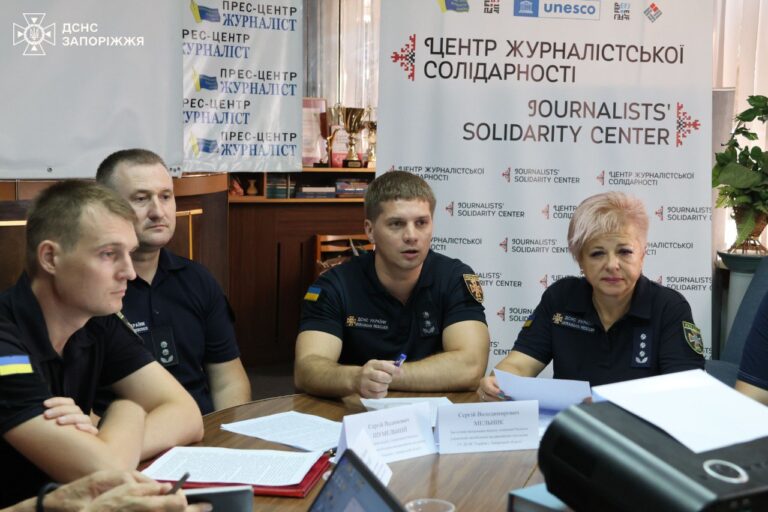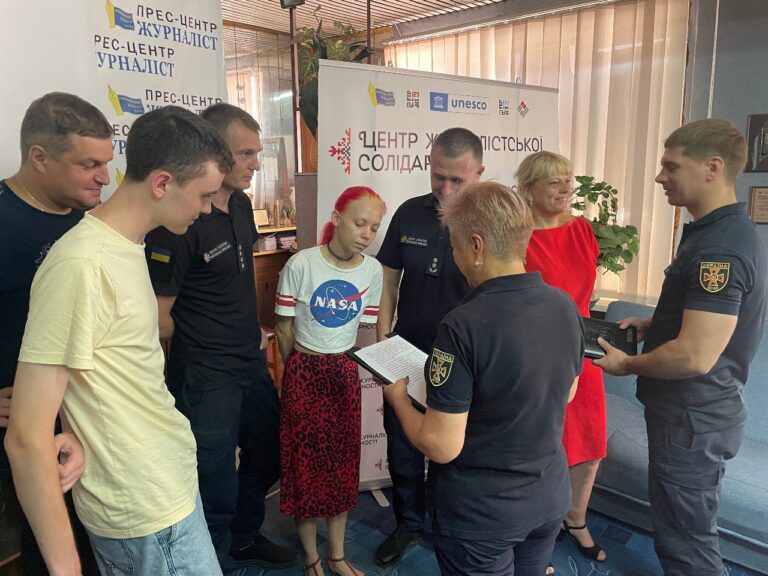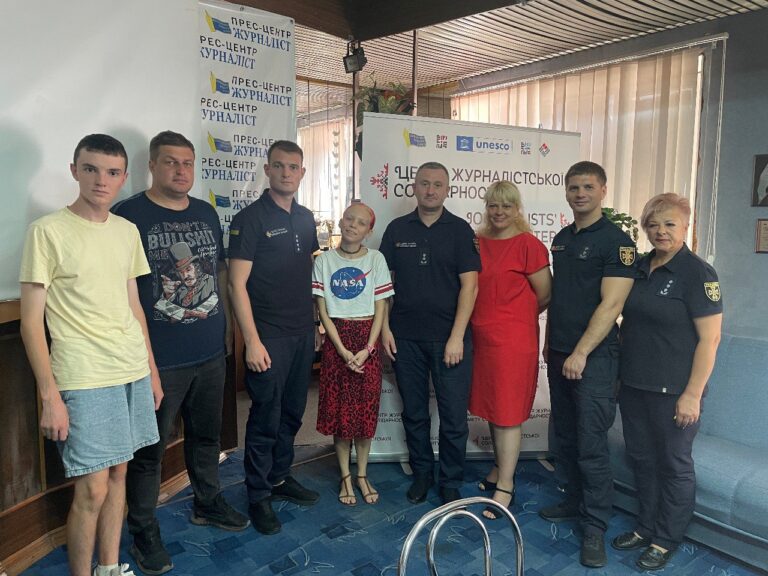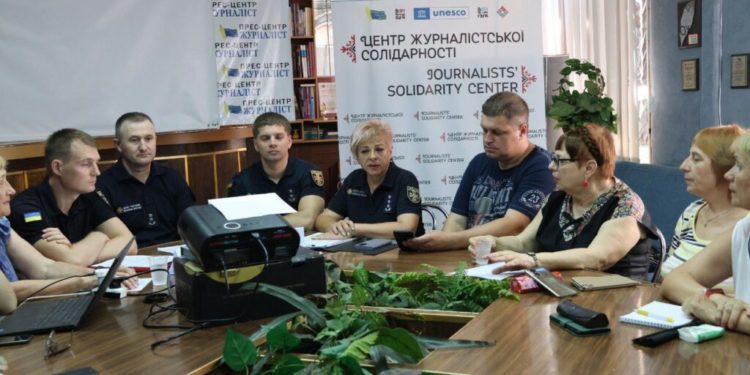The Zaporizhzhia Journalists’ Solidarity Center (JSC) of the National Union of Journalists of Ukraine (NUJU) held safety training for media workers in several areas at once. They talked about the main risks of the summer period, temperature records, extraordinary events on the water, almost daily fires, and about landmine safety. After all, journalists are usually among the first to arrive at events and collect materials in a high-risk area, so it is important for them to know and follow the rules of life safety.
“Your job is not only to know the safety rules yourself and follow them, but also to tell others about it. Experienced moderators and specialists of the Main Department of the State Emergency Situations Service (SESS) in the Zaporizhzhia Region will work with you. Therefore, we listen, discuss information, and ask questions in order to leave our meeting trained, which means – armed,” emphasized, opening the training, the head of the department of relations with mass media and work with the public, colonel of civil defense Yuliya Barysheva.
Serhii Melnyk, deputy head of the fire safety division of the emergency prevention department of the Main Department of the SESS of Ukraine in the Zaporizhzhia Region, told reporters about the causes and problems of fires in ecosystems in summer and the rules of safe behavior during work or recreation in open areas. How important it is, the numbers show eloquently.
Since the beginning of 2024, a total of 1,075 fires have occurred in the natural ecosystems of the Zaporizhzhia Region on an area of 275 hectares, of which 51 fires were caused by shelling. This is almost two and a half times more compared to last year. The main causes of fires are heat and people’s carelessness. The specialist also talked about joint work with local authorities and police representatives to reduce the number of fires in the region that may occur due to the human factor. We need to learn ourselves and teach people to be responsible for the implementation of elementary rules of life safety. When asked what a journalist can do if he witnesses a fire during his work, Serhii Melnyk emphasized:
“First of all, protect yourself and the people nearby, and immediately call rescuers. You can do something yourself only when the fire has just started, and you can easily knock down the flames with improvised means. In all other cases, wait for specialists and take care of your own safety.
Similar rules of behavior should be observed near water bodies or on the water bodies themselves. The main thing is not to expose yourself to danger, and it exists. It is quite serious,” said Serhii Shumelnyi, the head of the industrial safety department of the emergency prevention department of the Main Department of the SESS of Ukraine in the Zaporizhzhia Region. “Resting in reservoirs and swimming in the Zaporizhzhia Region is prohibited because there are no shelters on any beach, and we are in the zone of constant shelling. And the water itself can be dangerous because of debris or parts of ammunition. Not to mention the fact that not everyone is a good swimmer, but they are often lighthearted on the water, and children should not be left unattended if you are relaxing near a body of water. But people still take risks by ignoring safety rules. Do not do it yourself, and tell others about the danger that threatens them.”
More details were discussed during the training on issues of landmine safety. In the front-line territories, there is the danger of landmines both on land and on water. After all, they are subjected to constant shelling and bombing; therefore, unexploded ammunition, mines, and fragments of cluster bombs, etc., can be found here.
“And the journalists who are in the epicenter of the events are clearly in a special risk zone,” stressed Oleksii Bezverkhnii, the chief specialist of the humanitarian demining department of the Main Department of the SESS of Ukraine in the Zaporizhzhia Region. “And that is why we draw your particular attention to mine safety.”
The algorithm of actions after detection of explosives and suspicious objects:
- in no case do not touch or move the suspicious object with your hands;
- mark with sticks (clothes, stones, etc.) the place where the suspicious object was detected;
- warn other people nearby about the find. Take them away and go to a safe distance yourself (at least 100 meters);
- the only official channel for reports on the detection of suspicious explosive objects is a call to the emergency numbers – 101 or 102;
- do not use telephones or other means of radio communication near a suspicious object;
- do not try to disassemble a suspicious object, remove an explosive substance or a detonator from it;
- remember that a dangerous find can be found in unexpected places (fields, forests, reservoirs, gardens, and ruins);
- pay attention: even the slightest external impact (impact, shock, friction, heat, etc.) can activate dangerous objects.
Zaporizhzhia media people unanimously noted the usefulness and relevance of the training.
Call the Zaporizhzhia JSC at 096 277 5352 (Nataliya Kuzmenko and Valentyna Manzhura, the Zaporizhzhia JSC coordinators). The Center’s address is 152 Sobornyi Avenue.



ABOUT JSC
The Journalists’ Solidarity Centers is an initiative of the NUJU implemented with the support of the International and European Federations of Journalists and UNESCO. The initiative is designated to help media representatives working in Ukraine during the war. The Centers operate in Kyiv, Lviv, Ivano-Frankivsk, Chernivtsi, Zaporizhzhia, and Dnipro and provide journalists with organizational, technical, legal, psychological, and other types of assistance.
ABOUT UNESCO
UNESCO is the United Nations Educational, Scientific, and Cultural Organization. It contributes to peace and security by promoting international cooperation in education, sciences, culture, communication, and information. UNESCO promotes knowledge sharing and the free flow of ideas to accelerate mutual understanding. It is the coordinator of the UN Action Plan on the Safety of Journalists and the Issue of Impunity, which aims to create a free and safe environment for journalists and media workers, thus strengthening peace, democracy, and sustainable development worldwide. UNESCO is working closely with its partner organizations in Ukraine to provide support to journalists on the ground.
The designations employed and the presentation of material throughout this digest do not imply the expression of any opinion whatsoever on the part of UNESCO concerning the legal status of any country, territory, city, or area or its authorities or concerning the delimitation of its frontiers or boundaries.
The authors are responsible for the choice and the presentation of the facts contained in this digest and for the opinions expressed therein, which are not necessarily those of UNESCO and do not commit to the organization.
Valentyna Bystrova
Olena Karelina
Photo by Dariya Zyrianova and Hanna Lohvynenko

 THE NATIONAL UNION OF
JOURNALISTS OF UKRAINE
THE NATIONAL UNION OF
JOURNALISTS OF UKRAINE
















Discussion about this post